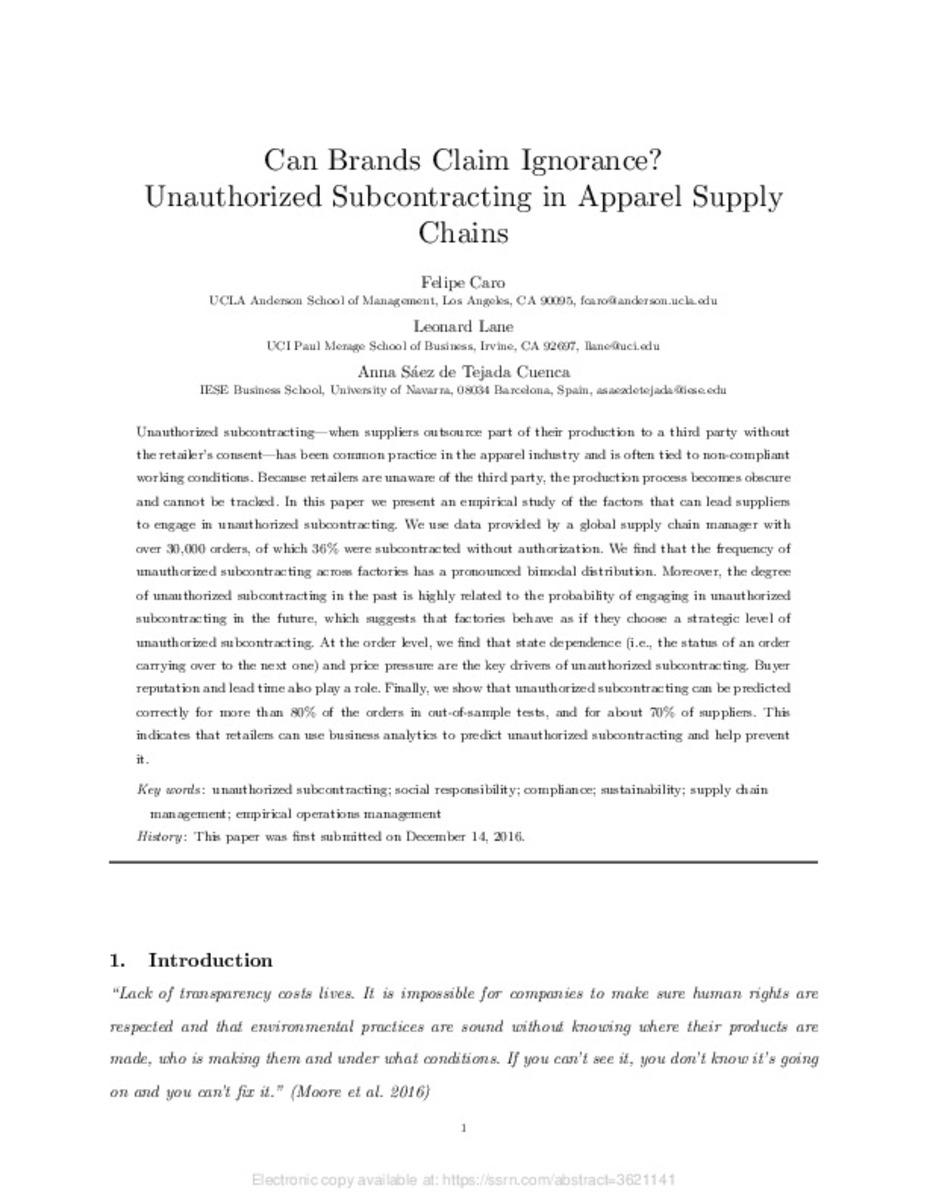Full metadata record
| DC Field | Value | Language |
|---|---|---|
| dc.creator | Caro, F. (Felipe) | - |
| dc.creator | Lane, L. (Leonard) | - |
| dc.creator | Sáez-de-Tejada-Cuenca, A. (Anna) | - |
| dc.date.accessioned | 2021-06-15T07:10:00Z | - |
| dc.date.available | 2021-06-15T07:10:00Z | - |
| dc.date.issued | 2020-09-22 | - |
| dc.identifier.citation | Caro F; Lane L; Sáez-de-Tejada A. "Can brands claim ignorance? Unauthorized subcontracting in apparel supply chains". Management Science. 67 (4), 2020-09-22, 1 - 30 | es_ES |
| dc.identifier.issn | 1526-5501 | - |
| dc.identifier.uri | https://hdl.handle.net/10171/60686 | - |
| dc.description.abstract | Unauthorized subcontracting—when suppliers outsource part of their production to a third party without the retailer’s consent—has been common practice in the apparel industry and is often tied to noncompliant working conditions. Because retailers are unaware of the third party, the production process becomes obscure and cannot be tracked. In this paper, we present an empirical study of the factors that can lead suppliers to engage in unauthorized subcontracting. We use data provided by a global supply chain manager with more than 30,000 orders, of which 36% were subcontracted without authorization. We find that the frequency of unauthorized subcontracting across factories has a pronounced bimodal distribution. Moreover, the degree of unauthorized subcontracting in the past is highly related to the probability of engaging in unauthorized subcontracting in the future, which suggests that factories behave as if they choose a strategic level of unauthorized subcontracting. At the order level, we find that state dependence (i.e., the status of an order carrying over to the next one) and price pressure are the key drivers of unauthorized subcontracting. Buyer reputation and lead time also play a role. Finally, we show that unauthorized subcontracting can be predicted correctly for more than 80% of the orders in out-of-sample tests and for about 70% of suppliers. This indicates that retailers can use business analytics to predict unauthorized subcontracting and help prevent it. | es_ES |
| dc.language.iso | eng | es_ES |
| dc.publisher | INFORMS | es_ES |
| dc.rights | info:eu-repo/semantics/openAccess | es_ES |
| dc.subject | Unauthorized subcontracting | es_ES |
| dc.subject | Social responsibility | es_ES |
| dc.subject | Compliance | es_ES |
| dc.subject | Sustainability | es_ES |
| dc.subject | Supply chain management | es_ES |
| dc.subject | Empirical operations management | es_ES |
| dc.subject | Subcontratación no autorizada | es_ES |
| dc.subject | Responsabilidad social | es_ES |
| dc.subject | Cumplimiento | es_ES |
| dc.subject | Sostenibilidad | es_ES |
| dc.subject | Gestión de la cadena de suministros | es_ES |
| dc.subject | Gestión de operaciones empíricas | es_ES |
| dc.title | Can brands claim ignorance? Unauthorized subcontracting in apparel supply chains | es_ES |
| dc.type | info:eu-repo/semantics/article | es_ES |
| dc.relation.publisherversion | https://pubsonline.informs.org/doi/abs/10.1287/mnsc.2020.3679 | es_ES |
| dc.identifier.doi | https://doi.org/10.1287/mnsc.2020.3679 | - |
| dadun.citation.endingPage | 30 | es_ES |
| dadun.citation.number | 4 | es_ES |
| dadun.citation.publicationName | Management Science | es_ES |
| dadun.citation.startingPage | 1 | es_ES |
| dadun.citation.volume | 67 | es_ES |
Files in This Item:
Statistics and impact
Items in Dadun are protected by copyright, with all rights reserved, unless otherwise indicated.






